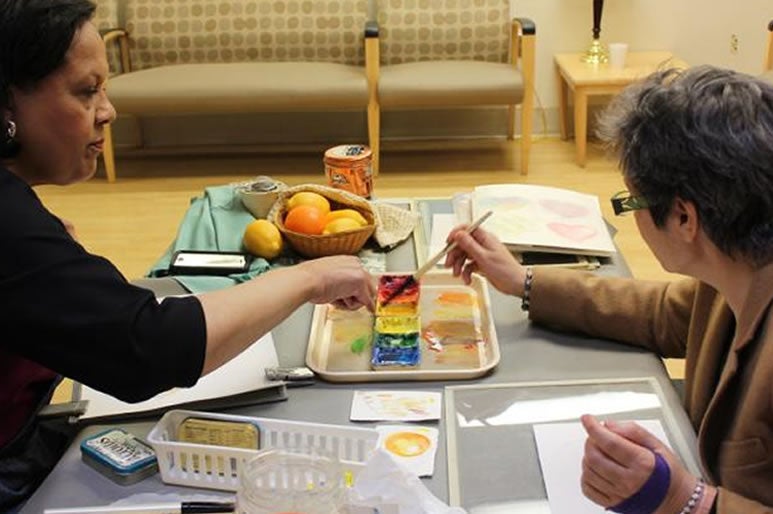Patient and Family Resources
Arts & Humanities Program

The Georgetown Lombardi Comprehensive Cancer Center Arts & Humanities Program promotes an optimum life experience for patients, family members, and caregivers with activities, resources, education and environments that encourage a creative and constructive response to illness.
Cancer Rehabilitation Services
Rehabilitation helps cancer patients address challenges such as pain, fatigue, difficulty speaking or swallowing, or other challenges that might be affecting their quality of life. It can improve quality of life before and during cancer treatment. Cancer-related problems can extend beyond initial care, and rehabilitation can maximize a cancer survivor’s ability to regain endurance and mobility and improve their daily living activities. Services are provided through the MedStar National Rehabilitation Network.
(202) 295-0513
Cancer Survivorship Program
The Cancer Survivorship Program, a service of MedStar Georgetown Cancer Institute, provides complete care for the whole person after treatment ends. Many cancer survivors have unique short- and long-term health needs that require follow-up care. A comprehensive, personalized survivorship care plan will help cancer survivors prepare for a healthy future. Our specialists in cancer survivorship understand survivors’ health concerns and are ready to help them live well.
(202) 444-2223
Ethics Consultation
Ethicists familiar with health care issues are available to discuss any moral conflicts or ethical concerns with patients and families who are dealing with challenging health care decisions. More information can be found on the Ethics Consult Service section of the Additional Services page on the MedStar Georgetown University Hospital website.
(202) 405-3959
Fitness Consultation
Breast cancer patients seeking medical advice on maintaining and/or improving physical fitness can request a consultation with a physician who performs a physical examination, fitness evaluation and specific recommendations for cardiovascular, strength and core training and nutrition before, during and after cancer treatment.
(202) 687-8986
Genetic Counseling
Counselors offer patients and families assistance and care in determining familial cancer risk, options for genetic testing, and information about screening and risk reduction.
Learn more about MedStar Georgetown University Hospital’s genetic counseling services. View the hospital’s Cancer Genetic Counseling Program brochure.
(202) 444-0023
Nutrition Counseling
Nutrition is vital to everyone’s good health. It takes on added importance when a person develops cancer. Why? Because good nutrition may become compromised during cancer treatment.
(202) 444-7423
Pastoral Care
An interfaith team of chaplains and volunteers serves people of every religious affiliation who are receiving inpatient or outpatient care.
(202) 444-3030
Pediatric Hematology/Oncology Support Programs
The Division of Pediatric Hematology/Oncology cares for our youngest patients with a focus on “family centered care.” All support services are specifically tailored to the needs of children, teens and their families, including siblings.
Psycho-Oncology Services
A psychologist works in conjunction with the oncology team to address the emotional well-being of patients and their families. Therapy may address issues such as distress, adjustment, anxiety, depression, family issues and coping techniques.
(202) 687-6925
Smoking Treatment and Recovery (STAR) Program
STAR is a clinical program for MedStar Georgetown Cancer Institute patients who are currently smoking or who have quit recently. It is staffed by nurse practitioners and tobacco treatment specialists who provide coaching, support and medications to help patients stop smoking. Coaching and support are provided at in-person clinic appointments and by phone.
(202) 784-7827 (STAR)
star@medstar.net
Social Work Services
Oncology social workers provide ongoing support including adjustment to illness counseling, crisis intervention, education, community referrals, and support group facilitation. Pediatric social workers also help with school issues, including arranging for home and hospital teaching, and community referrals.
Adults: (202) 444-3755
Pediatrics: (202) 444-7599
Support Groups
Support groups can help patients and their families cope with the emotional and physical stresses of a cancer diagnosis and treatment.
